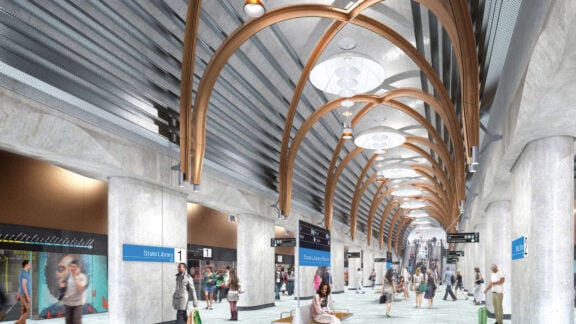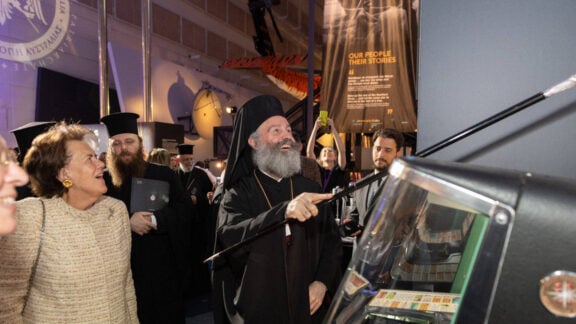Neos Kosmos was told by Louka Nitsas that his wife Maoyin Dou, and their two children, aged three and five years old, were set to board a flight on an Australian aircraft at 2 pm on Friday.
“We’re leaving today, 2 pm, and we’re flying to Brisbane,” a relieved Nitsas told Neos Kosmos.
Loukas Nitsas and his family arrived in New Caledonia with his young family two days before the island became engulfed by deadly violence.

On Thursday night, at 10:36 pm, Nitsas sent a Greek voice message.
“Friend, you won’t believe this,” Nitsas’s recorded message began, “my wife decided to call the Chinese Embassy, and within a mere 20 minutes, we received a call from the French Consulate informing us that we could leave the next day.”

Maoyin is an Australian citizen with a Chinese passport and got support from the Chinese Embassy, said Nitsas.
Nitsas said they had received an email from DFAT on May 24 at 1 am New Caledonia time, telling them that the Australian Government “stands ready to assist more tourists out of New Caledonia and has planes ready to fly.”
The email said the Australian government had “not been given clearance for additional flights”.
“We are working to ensure flights tomorrow,” it said.
Nitsas expressed his disappointment, feeling that Australia prioritised foreign nationals such as the Japanese and the British over its own citizens.
When Neos Kosmos first spoke to Nitsas last Wednesday, he shared that the first tourists who managed to escape the resort island they were all stranded on were honeymooning Japanese couples, not Australian citizens.
The family has been stranded at DoubleTree Resort on Escapade Island, a marine reserve 20 minutes from Nouméa by taxi boat. From there, Nitsas could see Nouméa burning.
Maoyin Dou, Nitsas’s partner, told the masthead that Australia had sent two C-130 Hercules.
According to reports, planes arrived on Tuesday afternoon at Magenta Airport — the domestic airport in New Caledonia’s capital, Nouméa.
“The first to leave were Japanese honeymooning couples, who told us they took the Australian plane.
“The Japanese said they had a phone call to board the Australian planes – registered under Foreign Affairs,” Maoyin said.
She called DFAT, as she does regularly, and was told that they “hadn’t contacted anyone” and that it “may have been another authority”.
According to the Japanese national daily, The Mainichi Japanese nationals in New Caledonia have evacuated with support from Australia.
Maoyin Dou said she feels more secure now than when her partner Loukas Nitsas spoke to Neos Kosmos because “The Chinese, Australian, New Zealand and French governments are now acting.”
She is concerned, though, and called DFAT with the request to “escalate the situation”.
“We’re Australian citizens, and we have two kids, three and five”.
“DFAT said they would ‘make a note’; this morning, more Japanese couples, some Kiwis, and a few Australians left the resort – around 75,” said Maoyin.
She said there has “been confusion and miscommunication given the situation”.
“A Chinese national living in the UK got a call to say he should get to a specific hotel in 45 minutes so they can leave for the airport, but reception could not organise a water taxi; someone else got a call at call 3.57 pm to be at the hotel by 4.00 pm, impossible.
“But it’s much better now than it was a few days ago – they are at least taking action,” Maoyin said.
Her great concern is the young children and her husband “Lukas, who has a medical condition, Crohn’s disease”.
Moayin said that the military presence is more evident.
“We saw a French military airplane circling very low above the resort island a day ago.”

She also said she could still see Nouméa burning.
“We can still see smoke across to Nouméa; it’s less than the first three days; yesterday, though, there was one big dark black mushroom cloud smoke which is still burning.”
Maoyin called DFAT daily and, along with her partner Nitsas, is anxious to return to Melbourne.
Nitsas told Neos Kosmos that when they arrived in New Caledonia before the violence erupted, they were confronted by “lots of large Kanak flags” as they drove in from the airport. The roads were full of Indigenous Kanak men “on utility vehicles with large Kanak flags”.
“I said half joking to my driver, ‘It seems that they don’t like the French’, and little did I know what would happen,” he said
“You could see the anger in their eyes, the way they were looking at us. They don’t know we’re not French,” he said.
Nitsas and his family’s holiday was interrupted two days later when they heard shots and saw plumes of smoke rising from Nouméa from the island resort DoubleTree – 30 minutes by boat taxi ride from Nouméa.

“You could see the smoke rise from lots of places on Nouméa; the island was full of smoke,” he said.
Their concern is getting off the resort island and hopefully not confronting ambushes on the road to the airport.
The French government has imposed a State of Emergency and the violence has caused at least six deaths and resulted wholescale burning and looting. French President Emmanuel Macron is heading to New Caledonia, the government has announced, as hundreds more security personnel will join the 1,500 reinforcements already on the ground after the worst unrest in the French Pacific territory in more than 30 years.
New Caledonia, a French territory in the South Pacific, has been under French control since the 1850s. A proposed constitutional amendment by France’s National Assembly aims to allow for French residents who have lived in New Caledonia for 10 years to vote in local elections.
Currently, the electoral system restricts voting rights to natives and those who moved to New Caledonia before the 1998 Nouméa Accord, along with their descendants. Kakak, pro-independence supporters are contesting this change because they fear it may marginalise the indigenous people, who have suffered from discrimination during colonisation.
Australians needing emergency consular assistance should contact the Australian Government’s 24-hour Consular Emergency Centre on 1300 555 135 (within Australia) or +61 2 6261 3305 (from overseas).









